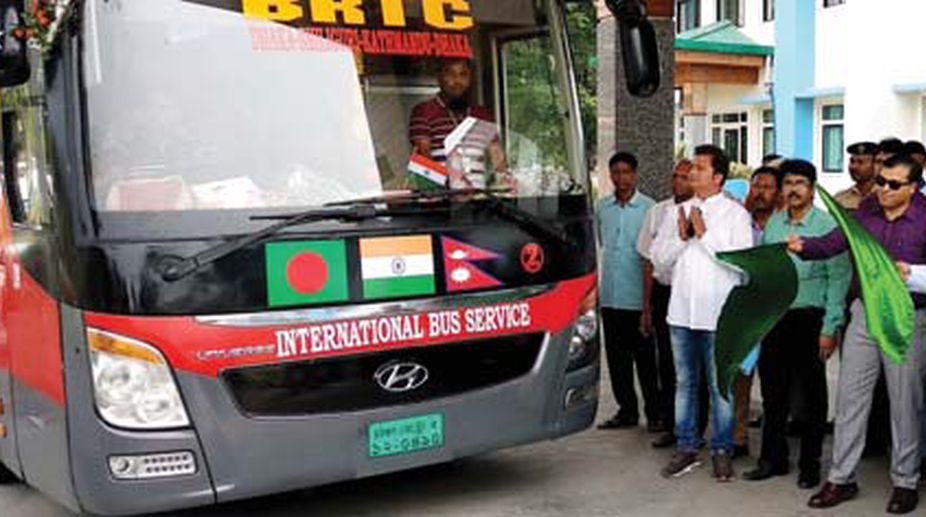Indian officials flagged off two buses, which had reached Siliguri from Dhaka in Bangladesh, at Uttarkanya, the state government’s north Bengal secretariat, in Siliguri on Wednesday.
Delegates from Bangladesh, India and Nepal headed for Kathmandu in Nepal in the buses that are currently on a trial run under the Bangladesh-Bhutan-India- Nepal (BBIN) Motor Vehicle Agreement.
Advertisement
The trial run, which began from Dhaka on 23 April, will end in Kathmandu on 26 April. The delegates arrived here yesterday evening through the Banglabandha- Fulbari Indo-Bangladesh border.
The buses will cover the routes along Asian Highway- II, which is being built by connecting Nepal and Bangladesh. Top officials in the Indian part, including the Commissioner of the Jalpaiguri division, Barun Ray, welcomed the delegates at Uttarkanya and flagged off the buses.
Over 50 delegates are travelling in the buses that left for Kathmandu via the Panitanki- Kakarvitta (Indo-Nepal) border near Siliguri this morning. In the Indian part, the West Bengal government organised a small cultural programme, including dances performed by the Kalimpong Lepcha Cultural Society.
Addressing the welcome ceremony, Jalpaiguri division commissioner, Mr Ray said: “The successful trial run and execution of the BBIN agreement with four countries will definitely boost the tourism industry. We hope that the road connectivity system will strengthen more.”
Additional secretary and chairman of the Bangladesh Road Transport Corporation (BRTC), Farid Ahmed Bhuiyan, said the passenger vehicles are functioning as a bridge between the countries.
“Following the execution of the BBIN Motor Vehicle Agreement, which was inked on 15 June 2015, the prospects of trade and commerce will definitely increase,” he said.
“Representatives of three countries will study its feasibility and observe the situation, including the social state of affairs, during their journey from Dhaka to Kathmandu and exchange notes and prepare reports, while the same would be implemented through protocol signed by respective counties,” Mr Bhuiyan said.
“I have received several phone calls from many people, even from Nepal and India, associated with tourism. They were eagerly asking about the implementation of the BBIN,” he added.
The entire route from Dhaka to Kathmandu is 1200 km. “We expect that the exchange of letters will take place very soon, followed by a protocol signed by the three countries. Ratification between India and Bangladesh has been completed. Ratification in Nepal is also completed, but it was yet to be approved by the Nepal Cabinet due to the change of guard there. But we hope the process will be completed shortly,” Mr Bhuiyan told The Statesman.
Talking to reporters, a senior divisional engineer associated with Nepal’s Ministry of Physical Infrastructure and Transport, Govinda Prasad Kharel, said: “In Bangladesh and up to Siliguri, we found very good infrastructure and the condition of the road and bridges was good. The condition of roads in my country is also good, except for a little stretch of around 20 km in the mountain region, where a road-widening project is going on.”
“The ratification has been done in India, Bangladesh and Nepal. We are waiting for the ratification, which is under process, from Bhutan. As Bhutan completes the ratification, the four countries will benefit in trade and commerce with this regional connectivity,” Mr Kharel said.











